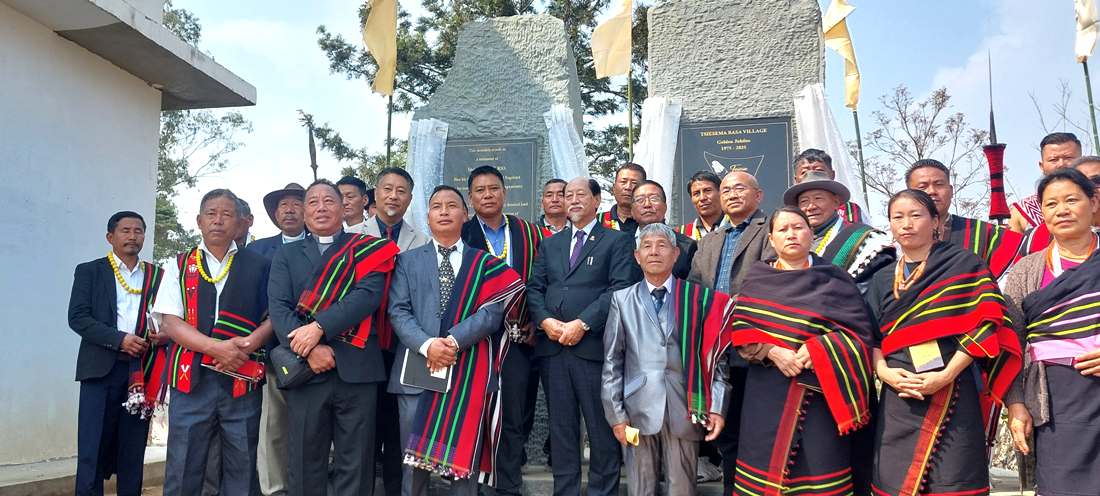FRIDAY, MAY 16, 2025
- Home
- Unresolved Naga political issue hinders development — CM Rio
Unresolved Naga political issue hinders development — CM Rio
Published on Feb 18, 2025
Share

Neiphiu Rio with other legislators and village leaders of Tsiesema Basa village on Tuesday. (EM Images)
- TSIESEMA — Chief Minister Neiphiu Rio on Tuesday said that the unresolved Naga Political issue has hindered development in the state, and emphasised the need for an early resolution.
- The chief minister said owing to the protracted Naga issue, the aspirations of the Naga people have not been fulfilled, even though the state government has been pursuing with all seriousness for an early resolution to pave the way for development.
- Rio was addressing the 50th celebration of Tsiesema Basa village establishment held at the village local ground, under Kohima district.
- He said the ‘Protected Area’ status was due to Nagaland being tagged as ‘Disturbed Area,’ which was later changed to ‘Prohibited Area,’ but the protected area regime was re-imposed recently.
- He noted that tourist visit to the state has been increasing over the years with more than 2 lakh visitors during the last Hornbill Festival alone. But this growth could be hindered due to re-imposition of protected area regime, he said.
- On the Free Movement Regime (FMR), he highlighted the state government’s concern over the international boundary set by the British without consulting the Nagas, which divided Naga families and land.
- As a case in point, he cited Longwa village in Mon district where the Angh’s house lies at the centre of the international boundary.
- Maintaining that the Naga political issue needs thorough consultation for an early resolution, the chief minister said that the current 60-member of the Nagaland Legislative Assembly had formed an opposition-less government and passed a resolution for early solution to the Naga political issue.
- The resolution was also conveyed to Delhi, but solution still eludes, he said.
- Rio also informed that the Bengal Eastern Frontier Regulation (BEFR) Act of 1873, passed by the British Parliament, continues even today in post-independent India in the form of special provisions for Nagaland State under Article 371 (A).
- While Article 371 (A) recognised the uniqueness of the Nagas, the same has not been fully recognised by Nagas themselves, which acts as a hindrance, he added.
- He went on to mention that the Dobashi and Gaon Bura systems are also British legacies.
- On identity, tradition and culture of the Nagas which remained untouched even during British rule, Rio stressed that during the Hornbill Festival, foreigners come not to see how Nagas adapt to other cultures, but to witness the authenticity of the Naga identity and culture.
- Further, though people tend to get confused during elections, he asserted that the regional Nationalist Democratic Progressive Party (NDPP) stands to safeguard and protect regional interests.
- Meanwhile, the chief minister paid tribute to the pioneers of the village for their visionary steps in establishing the village, which has grown exponentially into a geographically strategic location.
- He noted that establishing a new village is a herculean task, requiring sacrifices and suffering from the founders. In olden times, due to headhunting, people lived on hilltops for safety. However, with changing times, they began seeking lower areas for easier habitation.
- Rio also acknowledged Tsiesema Basa village for honouring and inviting him to the commemorative event, coinciding with his political innings spanning 50 years.
- On the occasion, the chief minister unveiled a monolith marking Tsiesema Basa Village Council's 50th year celebration and another monolith commemorating his 50th year in public service.
- On the occasion, he also highlighted initiatives like the Chief Minister Health Insurance Scheme (CMHIS), and the Chief Minister Micro Finance Scheme (CMMFS) to encourage entrepreneurship, SHGs and farmers.
- Chüpfhü-o Khrodi, the oldest man of Tsiesema Basa, shared the village's history, stating it was officially established in 1975, starting with 24 houses after migrating from Tsiesema Old. The village now has 106 households.
- Khrielezo Khro, chairman of Tsiesema village, also delivered greetings.
- Earlier, Razoukhrielie Khro, chairman of Tsiesema Basa village, requested the chief minister to construct a sports complex in the village.

